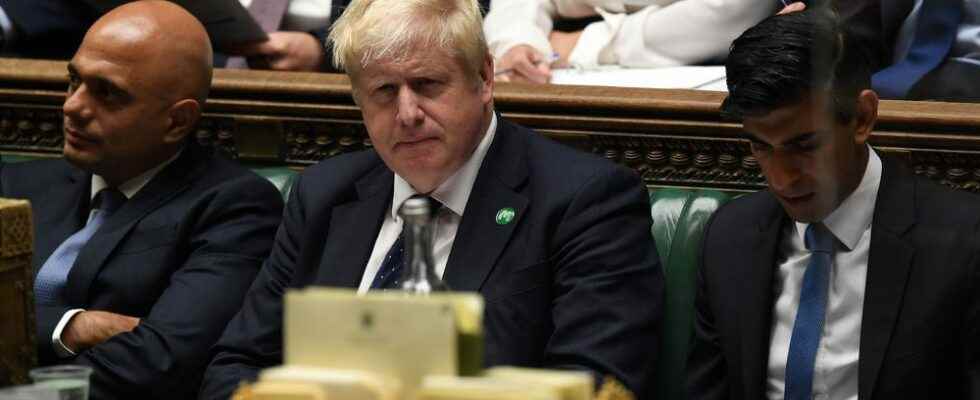Basically, this is the real reason for the dismissal of Boris Johnson by the Conservatives: opinion polls now place them up to 12 points behind Labour. The Prime Minister, after being their hero in the December 2019 general election – the party’s best result since Margaret Thatcher in 1987 – no longer has the ability to lead them to victory, with each new scandal sinking a little more popularity at half-mast. BoJo, charred by his escapades, has had its day.
For the Tories, from now on, only one question matters: who can lead them to victory during the next renewal of the House of Commons, at the latest in January 2025? According to the system in force, the members of the party will have to decide between the two finalists selected by their parliamentarians, after a series of votes by secret ballot.
In the past, this race has often proved unpredictable. In 2016, when the British voted in favor of Brexit, its figurehead, Boris Johnson, saw his luck slip away in favor of Theresa May through the fault of his main ally, Michael Gove. The latter had stabbed him in the back, claiming that he had “not what it takes” to become Prime Minister. Eleven years earlier, a certain David Cameron, unknown to the general public, had surprised David Davis.
This time again, the games are open. Hence the high number of suitors. Ben Wallace, the Minister of Defense, hailed for his management of the departure from Afghanistan and military support for Ukraine, is the most popular member of the government. He has for him to be a consensual figure, likely to unite the different tendencies of the party, like the Secretary of State for Commerce, Penny Mordaunt. Although a fervent Brexiteer, she has never been close to Johnson, whom she sharply criticized during “Partygate”.
Sajid Javid (left), Boris Johnson (centre) and Rishi Sunak (right) in Parliament.
afp.com/JESSICA TAYLOR
Of the two ministers whose resignations precipitated Johnson’s downfall, Sajid Javid and Rishi Sunak, the latter seems best placed. The former Chancellor of the Exchequer is the only conservative figure that the British prefer to Labor leader Keir Starmer, according to the JL Partners institute. Its image has long benefited from household support measures in compensation for anti-Covid restrictions. But he has suffered in recent months from revelations about the tax benefits enjoyed by his wife, the wealthy daughter of an Indian billionaire.
Many Thatcherites
Unlike a Johnson determined to turn on the spending tap, Sunak advocates a reduction in the debt and the public service budget. A Thatcherian vision which Liz Truss has made her guideline. Of all the government teams since 2014, the Minister of Foreign Affairs has played the mimicry card with “Maggie”, to the point of wearing outfits in colors as bright as those of her idol. She did not hesitate, too, to appear in front of the cameras on a tank, last December, echoing a similar posture of the former Prime Minister.
British Foreign Secretary Liz Truss on October 27, 2021, in London.
afp.com/Ben STANSALL
Preparing for months for Johnson’s succession battle, Liz Truss has assembled a small team to garner support among Tory parliamentarians. This is also the case for the brand new Chancellor of the Exchequer, formerly Minister of Education, Nadhim Zahawi. This follower of tax cuts would have already appealed, according to the Timesto Australian Lynton Crosby, the strategist behind the victories of Boris Johnson in the London municipal elections and David Cameron in the 2015 legislative elections.
Nadhim Zahawi, July 6, 2022, after his appointment as Chancellor of the Exchequer.
AFP/Daniel LEAL
The art of government investment
The moderate wing should not be outdone. Finalist against Johnson for the leadership of the party three years ago, Jeremy Hunt could try his luck again. But his opponents denigrate his lack of charisma and describe him as “Theresa May in pants”. To break with the exuberant BoJo, the Conservative parliamentarians could instead give a chance to another centrist figure, whose rating continues to rise despite his lack of government experience, Tom Tugendhat.
Tom Tugendhat, here in the UK Parliament on August 18, 2021.
Roger Harris / UK PARLIAMENT / AFP
This former soldier chairs the Foreign Affairs Committee. He is the first to have declared himself a candidate, to form “a broad coalition” of conservatives and bring “new energy and ideas”. But the right-wing of the party does not plead a priori in its favor. His candidacy will allow him, however, like others, to position himself for a ministerial position. It will also serve as a trial run before the next war of succession… inevitable in the event of defeat in the next elections.
Clement Daniez
